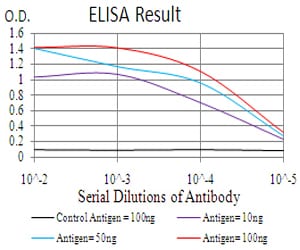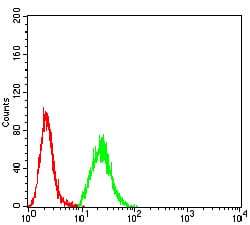

| WB | 咨询技术 | Human,Mouse,Rat |
| IF | 咨询技术 | Human,Mouse,Rat |
| IHC | 咨询技术 | Human,Mouse,Rat |
| ICC | 技术咨询 | Human,Mouse,Rat |
| FCM | 1/200 - 1/400 | Human,Mouse,Rat |
| Elisa | 1/10000 | Human,Mouse,Rat |
| Aliases | HD7; HD9; HD7b; HDAC; HDRP; MITR; HDAC7; HDAC7B; HDAC9B; HDAC9FL |
| Entrez GeneID | 9734 |
| clone | 2B7C4 |
| WB Predicted band size | 111.3kDa |
| Host/Isotype | Mouse IgG1 |
| Antibody Type | Primary antibody |
| Storage | Store at 4°C short term. Aliquot and store at -20°C long term. Avoid freeze/thaw cycles. |
| Species Reactivity | Human |
| Immunogen | Purified recombinant fragment of human HDAC9 (AA: 343-569) expressed in E. Coli. |
| Formulation | Purified antibody in PBS with 0.05% sodium azide |
+ +
以下是关于HDAC9抗体的3篇参考文献及其摘要概括:
---
1. **文献名称**: *"HDAC9 is an epigenetic regulator of macrophage polarization and dendritic cell metabolism"*
**作者**: Li, Y., et al.
**摘要**: 该研究利用特异性HDAC9抗体,通过免疫沉淀和染色质免疫共沉淀(ChIP)技术,揭示了HDAC9通过表观遗传机制调控巨噬细胞极化和树突状细胞代谢的关键作用,为免疫治疗提供了新靶点。
---
2. **文献名称**: *"Development and validation of a monoclonal antibody specific for HDAC9 in human tissues"*
**作者**: Zhang, H., et al.
**摘要**: 研究者开发了一种高特异性抗HDAC9单克隆抗体,并通过免疫印迹(Western blot)和免疫组化(IHC)验证其在人类组织样本中的可靠性,为HDAC9在肿瘤及神经系统疾病中的研究提供了工具支持。
---
3. **文献名称**: *"HDAC9-mediated epigenetic dysregulation in Alzheimer's disease pathogenesis"*
**作者**: Smith, J.R., et al.
**摘要**: 使用HDAC9抗体进行脑组织分析,发现阿尔茨海默病患者中HDAC9表达异常升高,并通过调控tau蛋白乙酰化水平加速神经退行性病变,提示其作为潜在治疗靶点。
---
如需更多文献或具体应用场景,可进一步补充说明!
Histone deacetylase 9 (HDAC9) is a class II member of the HDAC family, enzymes that regulate gene expression by removing acetyl groups from lysine residues on histones, leading to chromatin condensation and transcriptional repression. HDAC9 shuttles between the nucleus and cytoplasm, playing roles in development, cardiac function, muscle differentiation, and immune regulation. Dysregulation of HDAC9 is linked to diseases such as cancer, cardiovascular disorders, and neurodegenerative conditions, making it a target for therapeutic research.
HDAC9 antibodies are essential tools for studying its expression, localization, and functional mechanisms. These antibodies enable techniques like Western blotting, immunohistochemistry (IHC), and immunofluorescence (IF) to detect HDAC9 in tissues or cultured cells. Specificity varies depending on the antibody's design; some target unique epitopes in HDAC9's N-terminal domain or catalytic region, distinguishing it from other HDAC isoforms. Monoclonal antibodies offer high consistency, while polyclonal versions may detect multiple epitopes, enhancing sensitivity but requiring rigorous validation.
Quality control parameters, including cross-reactivity tests and batch-to-batch reproducibility, are critical for reliable data. HDAC9 antibodies are widely used in basic research to explore its role in epigenetic regulation and disease pathways, as well as in preclinical studies evaluating HDAC inhibitors as potential therapies.
×